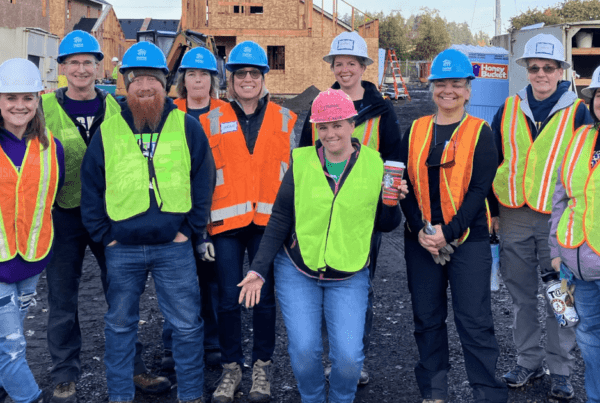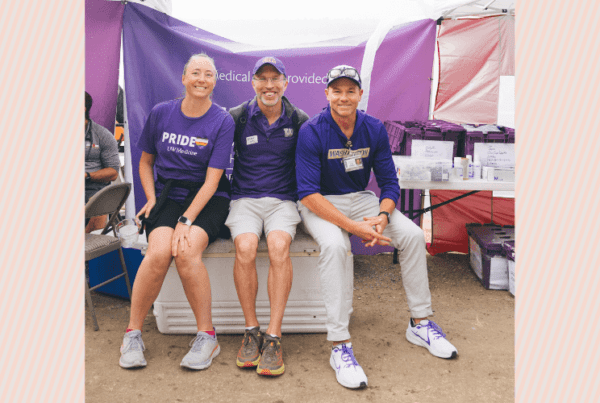HIGHLIGHTS | Providing a continuum of care
- At the Adult Autism Clinic, providers help people with autism navigate the transition to adulthood.
- For people with autism, turning 21 years old often means losing access to care and therapy.
- Adults with autism also face a lack of financial support and housing services from the state.
- The clinic hopes to help by expanding research, telehealth services and the number of providers in the future.
Turning 21 is a major milestone for anyone, but for people with autism it can be particularly life altering.
In Washington state, public entitlement for education ends at 21, meaning residents no longer have access to free, public education.
For people with autism and other developmental disabilities, oftentimes this means losing access to lifelong routines and communities as well as special education and the speech, behavior and occupational therapy that come along with it.
“Much work done in childhood and teen years isn’t really capitalized on until adult years, but if people don’t have opportunities to continue learning and growing, we see a significant percentage of people whose skills regress,” says Gary Stobbe, MD, the medical director of the Adult Autism Clinic in Ravenna. “We think if we are able to continue to build these opportunities, we’d have better outcomes.”
This is where the Adult Autism Clinic in Ravenna comes in.
Providing essential care
The Adult Autism Clinic is unique because of its focus on adults with autism and other developmental conditions and on training and supporting the providers, caregivers and family members who care for these adults.
“There’s a lot of demand and need for this population. There are very few primary care and specialist providers who feel equipped to provide care for adults with autism. It’s the type of work that often requires a multidisciplinary approach,” Stobbe says.
Over the past several decades, a boom in the number of autism cases has led to a huge need for resources and a shortage of essential care services.
At the Adult Autism Clinic, Stobbe and colleagues strive to help close that gap.
Stobbe and his team provide continued care for people with autism, helping them with the critical transition from school and their previous support systems to adulthood.
Services range from medication management for behavioral mental health conditions to autism spectrum diagnostic screening evaluations to care planning and identifying community resources, like therapy and job training.
Aiding crisis intervention
The clinic also works to prevent crises, like self-harm or violent outbursts.
“There is a lot of evidence showing higher incidents of co-occurring mental health conditions in young adults with autism spectrum disorder, most commonly depression and anxiety, but also sometimes aggression, self-injury and property destruction,” Stobbe says.
The reality for adults with autism in crisis can be tough.
As of 2018 in Washington state, 30% of Disability Discrimination Act clients, a whopping 14,448 individuals, were on a “No-Paid Services Caseload.” This means they are eligible to receive financial support and other services from the state, but they are not receiving any aid.
Without enough care resources and local facilities, these individuals can end up stuck in hospitals or in one of the state’s two Habilitative Mental Health Treatment units without anywhere to be discharged. For some patients, this can mean spending months to years in involuntary psychiatry units after they have been cleared for discharge.
The Ravenna team aims to stop these crisis events before they begin through preventative measures, like medication management and therapy. They are also conducting a study that retroactively looks at adults with autism admitted to UW Medical Center – Montlake and Harborview Medical Center to better understand what triggers crisis events and how to better prevent these events in the future.
Though much more work is needed throughout the state, Stobbe believes that with additional aid and proactive care, lives can be saved and improved.
Hope for the future
With the critical need for adult autism services, Stobbe seeks to expand the Adult Autism Clinic in Ravenna.
“My hope is that we would be able to build capacity in the clinic to provide opportunities for more specialty training for psychiatrists and neurologists who want to work with this population,” he says.
Stobbe aims to eventually add a fellowship opportunity for providers and to bolster research efforts on how to better support the community.
He also hopes to continue using telehealth, which has been added due to COVID-19, so that the clinic can reach patients throughout the state and consult with providers across the nation.
While there’s still a long way to go, Stobbe is optimistic.
“I believe very strongly that with appropriate supports, although those supports may cost more financially in the beginning, we can make a positive impact by improving lives along with our community as a whole.”


